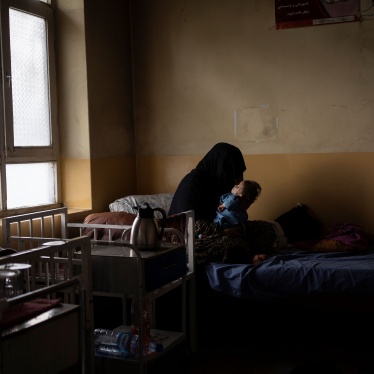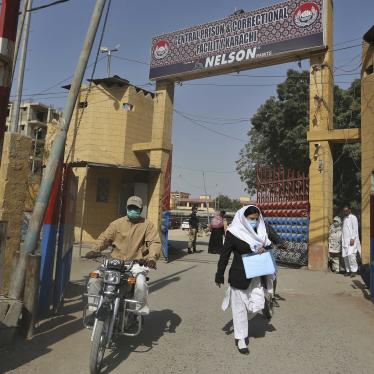(New York) - As HIV tests have become cheaper and more widely available, an increasing number of countries are supporting standalone HIV testing programs that are coercive or discriminatory, fail to ensure confidentiality, and do not provide access to prevention information or treatment, Human Rights Watch said today ahead of the XVI International AIDS Conference in Toronto.
Governments are also failing to address the widespread stigma faced by those testing positive, and are increasingly adopting or strengthening laws criminalizing HIV transmission. These laws are often arbitrarily applied and are ineffective at preventing HIV transmission, Human Rights Watch has found.
“There is little or no evidence that HIV testing by itself has any impact on this deadly epidemic,” said Joe Amon, director of the HIV/AIDS program at Human Rights Watch. “But voluntary HIV testing programs that respect rights, ensure confidentiality and are linked to counseling and treatment have been enormously successful.”
Countries around the world look to the United Nations health agencies, the World Health Organization (WHO) and the United Nations Joint Program on AIDS (UNAIDS), for guidance on HIV testing. These agencies should clearly and forcefully state that HIV testing programs must respect human rights and be linked to counseling and treatment, Human Rights Watch said.
Human Rights Watch pointed to a program in Uganda that provides treatment, counseling, condoms and voluntary HIV testing in people’s homes that has decreased HIV transmission by 98 percent. By contrast, research by Human Rights Watch in the Dominican Republic, Romania, and Zimbabwe found that HIV testing practices that were not voluntary, were not linked to counseling and care, and failed to protect confidentiality effectively discouraged people from seeking necessary care and led to increased stigma and abuse.
Human Rights Watch cited other examples from around the world of existing or proposed HIV testing programs that violated individual rights and contributed to neither HIV prevention nor treatment goals.
• In India, the state government of Goa has proposed mandatory premarital testing despite opposition by women’s groups and AIDS activists who recognize that empowering women to negotiate condom use and discuss AIDS with their partners and spouses is more important for their protection, before and during their marriage.
• Testing is mandatory in Saudi Arabia for foreign workers, who are then confined to locked hospital rooms and deported if found to be HIV positive.
• Village-to-village HIV testing in Lesotho, where the government budgeted U.S.$12 million for testing, but only U.S.$385 for post-test referral. The program proposes that every “household” be offered a test, but fails to ensure that each individual within a household is able to consent, or decline, to be tested.
Human Rights Watch also pointed to proposals in the last few years by governments such as Malawi and Sierra Leone to test all journalists; in China to test all workers in the tourism sector and beauty parlors in the city of Guiyang; in Botswana to test all students applying for scholarships; and in India, to test all individuals wishing to obtain or retain a driver’s license in Punjab state.
Human Rights Watch called on WHO and UNAIDS to condemn HIV testing approaches that violate human rights. The U.N. health agencies should update their 2004 HIV testing guidelines to recognize that only HIV testing programs that are linked to counseling and the provision of medical care have been proven to be effective.
“WHO and UNAIDS should clearly state that HIV testing programs must be voluntary and linked to counseling and treatment,” said Amon. “It is critical that we expand access to HIV testing. But testing programs will fail if they do not also provide people protection from stigma, discrimination and abuse.”






